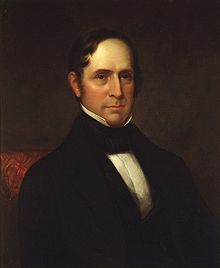Willie Person Mangum

Willie Person Mangum (born May 10, 1792 in Orange County , North Carolina , † September 7, 1861 in Red Mountain , North Carolina) was an American politician . He represented the state of North Carolina in both houses of Congress and was a candidate for the Whig Party in the 1836 presidential election .
Start of political career
Willie Person Mangum was born in the part of Orange County that later became Durham County . He attended the University of North Carolina at Chapel Hill , where he graduated in 1815 and began practicing as a lawyer in Red Mountain. At the same time he also began a political career. He was a member of the North Carolina House of Representatives from 1818 to 1819 .
After he was twice elected as judge in the Superior Court , he moved on March 4, 1823 as a member of the House of Representatives of the United States , where he remained until his resignation on March 18, 1826. As a member of the Democratic Party , he was then elected to the US Senate in 1830. There he represented his state from March 4, 1831 until his resignation on November 26, 1836. During this time he had changed from the Democrats to the National Republicans ; later he became a Whig. One reason for this was that he was controversial with President Andrew Jackson on most issues, including protective tariffs, nullification, and the Second Bank of the United States .
Presidential candidacy
In the 1836 presidential election, Willie Person Mangum was one of four Whigs candidates. The party's strategy was to defeat the Democratic candidate, Vice President Martin Van Buren , by means of regionally popular applicants in the individual states and then, as before in 1824 , let the House of Representatives decide the election . Mangum competed in the South Atlantic states; his candidate for the vice presidency was the future president John Tyler . In contrast to all other states, the electoral votes in South Carolina were not determined by a popular election, but by a vote of the state legislature. This won Mangum, which earned him eleven votes in the Electoral College . However, since not enough other states were won over, the Whigs' strategy failed; Van Buren became president.
Mangum returned to the US Senate on November 25, 1840. He had successfully contested the by-election for the seat of the resigned Bedford Brown and was henceforth one of the most important allies of Whig party leader Henry Clay in Congress . After the resignation of Senator Samuel L. Southard, he was President pro tempore of the Senate from 1842 to 1845 and thus the first successor to President Tyler, who had been promoted to the highest office of the state after the death of William Henry Harrison and was not a new Vice President under the constitution at the time was allowed to call.
Mangum remained in the Senate until March 3, 1853. The year before , he had rejected the Whigs' candidacy for US Vice President under Winfield Scott . When his party began to disband a little later, Mangum joined the American Party in 1856 . However, he no longer took over political office, worked as a lawyer again and died in 1861 of a stroke. Mangum had five children with his wife Charity Alston Cain, whom he married in 1819; their only son died shortly before his father in the first battle at Bull Run .
literature
swell
- Henry Thomas Shanks (Ed.): The Papers of Willie Person Mangum . 5 volumes. State Department of Archives and History, Raleigh NC 1950-1956.
- Digital copies at the Internet Archive : Volume I (1807-1832) ; Volume II (1833-1838) ; Volume III (1839-1843) ; Volume IV (1844-1846) ; Volume V (1847-1894) .
Secondary literature
- William S. Hoffmann: Willie P. Mangum and the Whig Revival of the Doctrine of Instructions . In: Journal of Southern History 22, 1956. pp. 338-54.
- Joseph Conan Thompson: Willie Person Mangum: Politics and Pragmatism in the Age of Jackson . Diss., University of Florida 1995.
Web links
- Willie Person Mangum in the Biographical Directory of the United States Congress (English)
- Willie Mangum person in the database of Find a Grave (English)
| personal data | |
|---|---|
| SURNAME | Mangum, Willie Person |
| BRIEF DESCRIPTION | American politician |
| DATE OF BIRTH | May 10, 1792 |
| PLACE OF BIRTH | Orange County , North Carolina |
| DATE OF DEATH | September 7, 1861 |
| Place of death | Red Mountain , North Carolina |


